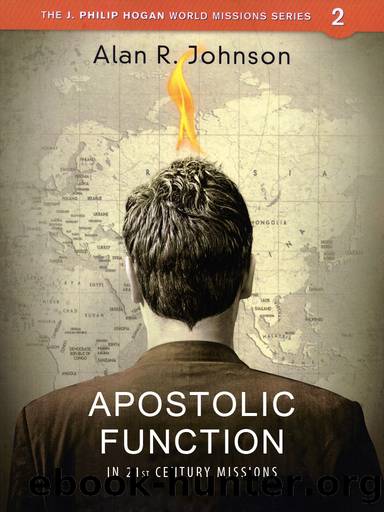Apostolic Function by Johnson Alan R.;

Author:Johnson, Alan R.;
Language: eng
Format: epub
Tags: Missions - Theory
Publisher: William Carey Publishing
Published: 2014-08-15T00:00:00+00:00
The Implication that Frontier Mission is the Only Valid Form of Mission
I think that is important to make a distinction between the actual concepts that make up frontier mission missiology and the ways in which it has been promoted, particularly from the late 1980s through the decade of the 90s. Beginning with his 1974 Lausanne address, Ralph Winter has been advocating a very specific type of missionary task, the pioneer task of breaking into a previously unreached culture with the Gospel. Yet even in that address he recognized at least four levels of valid ministry: the work of nurturing Christians, renewal of nominal Christians, ordinary E-1 near neighbor evangelism and the critical task of cross-cultural evangelism.260 His position is that although frontier mission is not more legitimate than other forms of mission, âit may, in a given situation in history, be more neglected.â261 In a sense, his work since the founding of the U.S. Center for World Mission has been to highlight this neglect and plead that the mission world take seriously the challenge that people groups represent. Focusing on the core concept, that people groups who do not have within them a church movement capable of providing E-1 near neighbor evangelism need a cross-cultural missionary effort from the outside, there would be little debate as to the validity of this point. There is very little controversy here as this is consonant both with missiological reality and biblical reality.
However, what has created a great deal of controversy and sense of uneasiness among mission agencies has been the impression conveyed by the broader frontier mission movement through its publications that frontier mission is the only truly valid form of mission in these days. In a presentation to the 1991 meeting of the International Society for Frontier Missiology Gary Corwin said:
The question is then posed, âIf reaching unreached peoples is the essence of mission, and if all but the stragglers among the unreached peoples are to be found within this [10/40] window, then what in the world are mission agencies doing in the rest of the world? And arenât they almost criminal in not deploying their resources more effectively?â While the argument may not always be stated so bluntly, the message permeates almost everything published on the subject. . . . the problem is that many fine mission organizations today feel they have been all but written out of the âfrontierâ missions script, and that their efforts are viewed as second-class at best.262
In 1992, Frank Severn wrote, âI am very uneasy abut some applications of the principle of reaching the unreached that call into question the validity or importance of missions to people where there are churches, albeit those churches may make up less than 1 percent of the total population.â263 Five years later, he writes:
My concern is that âpeople groupâ theology so dominates mission thinking in North American churches that âtrue and validâ mission only occurs when we focus on the unrelated people groups that have âno significant missiological breakthroughâ (no Bible, no church, no missionaries).
Download
This site does not store any files on its server. We only index and link to content provided by other sites. Please contact the content providers to delete copyright contents if any and email us, we'll remove relevant links or contents immediately.
Joan of Arc by Mary Gordon(3271)
Victory over the Darkness by Neil T. Anderson(2389)
The Gnostic Gospels by Pagels Elaine(2034)
Devil, The by Almond Philip C(1906)
The Nativity by Geza Vermes(1853)
The Psychedelic Gospels: The Secret History of Hallucinogens in Christianity by Jerry B. Brown(1829)
Going Clear by Lawrence Wright(1574)
Going Clear: Scientology, Hollywood, and the Prison of Belief by Lawrence Wright(1574)
Barking to the Choir by Gregory Boyle(1509)
A TIME TO KEEP SILENCE by Patrick Leigh Fermor(1500)
Old Testament History by John H. Sailhamer(1499)
Augustine: Conversions to Confessions by Robin Lane Fox(1475)
A History of the Franks by Gregory of Tours(1402)
The Knights Templar by Sean Martin(1399)
A Prophet with Honor by William C. Martin(1376)
The Bible Doesn't Say That by Dr. Joel M. Hoffman(1374)
by Christianity & Islam(1351)
The Amish by Steven M. Nolt(1254)
The Time Traveler's Guide to Medieval England by Ian Mortimer(1219)
